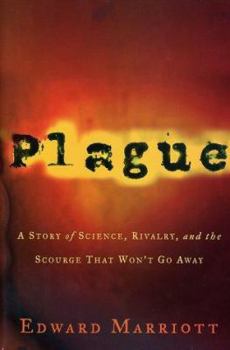Plague: A Story of Science, Rivalry, and the Scourge That Won't Go Away
Select Format
Select Condition 
Book Overview
A riveting account, at once a reconstruction of the race to find a cure, a history of bubonic plague, and an investigation into the threat of plague today Plague. The very word carries an unholy resonance. No other disease can claim its apocalyptic or mythological power. It can lie dormant for centuries, only to resurface with ferocious, nation-killing force. Here, with the high drama of a great adventure tale, Edward Marriott unravels the story of...
Format:Hardcover
Language:English
ISBN:0805066802
ISBN13:9780805066807
Release Date:March 2003
Publisher:Metropolitan Books
Length:320 Pages
Weight:1.02 lbs.
Dimensions:1.1" x 6.4" x 9.5"
Customer Reviews
5 ratings
Plague is not gone, just forgotten
Published by Thriftbooks.com User , 18 years ago
A great and resource heavy book. Enjoyed very much. My hubby took it away half way through my reading and I didn't get it back till he was finished. In a world of the next best terrorist action or weapon of mass destruction, we as a community tend to forget how dangerous a plague could be or an influenza for which there is not enough vaccine or medicine set aside. A good look at history tends to reinforce that looking backward might save the future....
rivalry between two scientists
Published by Thriftbooks.com User , 20 years ago
Edward Marriott's book is an interesting, well-written, anecdoctal account of two rival scientists studying the plague that struck Hong Kong in 1894. In the light of present day news stories of mad-cow disease, SARS, and other exotic ailments that possibly could pose a pandemic threat, Marriott's book is especially relevant. Marriott brings the rat-infested harbor area and the exceedingly crowded, poor districts of the city to vivid life. The stark pictures of those soon-emptied areas, so quickly deserted by panicked residents, are chilling to view. Recommended to all readers, and especially to those involved in public health issues.
It's out there!
Published by Thriftbooks.com User , 21 years ago
Plague, commonly known as The Black Death, has occurred in three major pandemics, and this is a fine history of the latest, which started in China in the late 19th century and spread worldwide from Hong Kong. Investigations into the nature of the disease in 1894 culminated in a contest between two early microbiologists, Kitasato and Yersin, a tale with obvious modern parallels. This historical footnote is one of the major themes of the book, but the author then follows the spread of Plague from Hong Kong to India and on to America. It has become entrenched in various wild animals worldwide. This is a great medical history, and one of the best of the rash of books on "killer diseases" that currently flood the market.
Lessons of History
Published by Thriftbooks.com User , 21 years ago
Ask most educated people about the plague and the response you will get probably revolves around the "Black Death" of the Middle Ages that wiped out a good portion of the population of Europe. Most books about the plague tend to focus on this period. But Marriott's book reminds us that the plague is not gone, still popping up its ugly head from time to time.In a world chilled by thoughts of bio-terrorism and SARS, most people tend to avoid books like this but I find them interesting. Humans will always be susceptible to disease but we will always fight back. In this book, Marriott tells the parallel stories of an outbreak of plague in southeast Asia in 1894 where two scientists--Alexandre Yersin and Shibasaburo Kitasato--tried to determine the process of this disease and an outbreak of plague in India in 1994 where he shows how panic still dominates our reactions to epidemics in our modern world. Along the way, he reminds Americans that plague also has its claws in the United States though our medical system tends to keep things at bay.Ultimately, Marriott gives us a good look into the foundations of modern medicine and how diseases came to be combated despite the combat, both intellectual and physical, between doctors of different nations and sensibilities. He also reminds us in a rather subtle way of how primitive our response to deadly sickness remains despite our drugs and treatments--something that we need to be reminded of in a world where we could be called to respond to an epidemic on many fronts. His prose may not be as gripping as some writers in this field (Richard Preston comes to mind) but he gets the job done in a very readable way.
Cupidity, Arrogance, and Altruism
Published by Thriftbooks.com User , 21 years ago
"Plague," is a briskly paced history for the non-specialist that opens with the graphic and frightening journey of a large rat through a Hong Kong market place that is a sure attention grabber. Author Edward Marriott also takes us to the back alleys and shantytowns of Africa, India, and the US as he explains the course of bubonic-plague, and the standard reactions of doctors and politicians wherever there's an outbreak.On a planet as small, with a population as fragile, it's a constant surprise that earth-dwellers have such difficulty doing the "right thing." "Plague" is a another chronicle of cupidity, and arrogance in medical research, thankfully blessed by the altruism of field epidemiologists who literally risked their lives to investigate a cause and cure for the "black death."The primary story is quite the thriller with two epidemiologists racing for an outcome - Shibasaburo Kitasato and his team coddled by Hong Kong's British governor, and Frenchman Alexandre Yersin, working alone and hampered by the governor. Although the results are history, "Plague," is enough of a thriller that I won't spoil the pleasure for readers who are not medical historians."Plague," had me glued to the page, and I recommend it to anyone who has a layman's interest in medical history.






